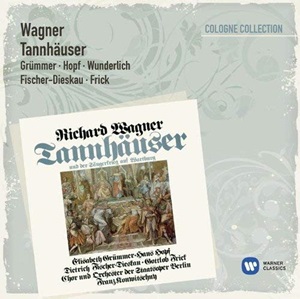
Richard Wagner (1813-1883)
Tannhäuser (Dresden version – 1845)
Hermann, Landgraf von Thüringen – Gottlob Frick (bass)
Tannhäuser – Hans Hopf (tenor)
Wolfram von Eschenbach – Dietrich Fischer-Dieskau (baritone)
Walther von der Vogelweide – Fritz Wunderlich (tenor)
Elisabeth – Elisabeth Grümmer (soprano)
Other cast listed after review
Orchestra & Chorus of the Staatsoper Berlin/Franz Konwitschny
rec. 1960, Grunewaldkirche, Berlin
Warner Classics 0965502 [3 CDs: 177]
Franz Konwitschny’s classic account of Tannhäuser, while not universally admired, it has stood the test of time for over 60 years. It has a couple of casting disappointments to be sure, but despite that it is among the best performed Tannhäusers on disc, and is certainly a high recommendation. This is especially the case if one is seeking the original Dresden version of Wagner’s fascinating score.
Recoded in a large Berlin Church, the sound definitely favours the voices in the mix, sometimes a little too much so. Regularly, the orchestral details are so backwardly placed as to become a bit lost in the sound field. Sometimes the spotlight on the voices goes overboard, especially for singers such as Hopf and Frick, who don’t really require it. However, there is a good stereo spread to the action, with just enough movement around the stage to keep things interesting.
Generally speaking, the cast really meets the demands of the score with accomplishment. Elisabeth Grümmer’s voice has a shimmering halo of sound which surrounds it. It gives the listener a sonic impression of the character of Elisabeth, having been depicted as a saint in an illuminated manuscript. This makes Grümmer the perfect embodiment of a character based on a Hungarian Medieval saint. Her voice is pure and it pours out long lines of gorgeous, shimmering tone. Only once or twice (such as in the climax of the duet with Tannhäuser) does it seem as if Elisabeth might need a little more body of tone than Grümmer is able to supply. Her singing reaches a level of radiance that one doesn’t encounter often.
Almost at her level is a ravishing account of Wolfram’s music by Dietrich Fischer-Dieskau. He sings with consistent beauty of tone and variety of expression to make him one of the finest exponents of the role on disc. Hearing his monologue during the song contest at the Wartburg is a lesson in control and fine shading of vocal lines that many singers would do well to emulate. Once or twice he pushes his vocal line a little; however, at this stage he had not begun to acquire the blustery habit that was to affect his singing in later years.
Hans Hopf is a strong-toned, firm-voiced tenor singing one of Wagner most difficult roles. He has all of the notes well in his voice and on the evidence here, he ranks high as one of the better singers to tackle Tannhäuser. However, he does tend to sing at unremitting forte, often coming across as a bull in a china shop. The extended Rome narration is a piece of cake for him and even the passage during the Act Two ensemble “Zum Heil den Sundigen” (which scares the pants off most tenors who tackle the part) is tossed off with ease, although without an iota of the tortured self-reflection that the role requires.
Marianne Schech is not a good choice of singer for Venus. She starts out well enough with a nice vocal shimmer to her tone; but by the time she reaches “Geliebter Komm!” it becomes apparent that her voice is rather thin for the part and simply lacks the proper vocal allure for this mountain-dwelling deity. Sadly, one wants her to go back into hibernation and let her vocal cords rest a while longer. Indeed, by having a Venus with little sensuality, the dramatic structure of the opera is thrown off-kilter.
Gottlob Frick has a luxurious, dark-toned bass which never seems to tire. His voice pours out authority and sure-footed tone throughout his solos. If anything, his tone is just too much for the kindly Landgrave. It seems that Frick’s dark tones are more apt for embodying the nastiness of Hagen and Fafner rather than the more muted persona of the Thuringian Count. Kurt Moll on Bernard Haitink’s recording is much more suited to this role than the overwhelming Frick.
The smaller roles are all ably cast, with a couple standouts, including the patrician voice of Fritz Wunderlich as possibly the finest of all Walther von der Vogelweides on disc. Lisa Otto’s delightfully piping tones makes a charmingly sweet-sounding shepherd.
Franz Konwitschny conducts a highly-charged reading of what is possibly my favourite of all of Wagner’s operas. From time-to-time Konwitschny chooses to linger over the occasional detail, but on the whole he charges forward with abandon, inspiring his performers along the way. The wonderful off-stage horn calls in the First Act Finale are quite dazzling in their power and beauty. Not surprisingly, this CD set is still available according to the Presto site. This recording retains much of its claim to be among the first choices for a Tannhäuser, particularly if one is seeking a decent version of the original Dresden score.
Mike Parr
Buying this recording via a link below generates revenue for MWI and helps us keep free access to the site


Other cast:
Biterolf – Rudolf Gonszar (bass)
Heinrich der Schreiber – Gerhard Unger (tenor)
Reinmar von Zweter – Reiner Süss (bass)
Venus – Marianne Schech (mezzo-soprano)
Hirt – Lisa Otto (soprano)

















